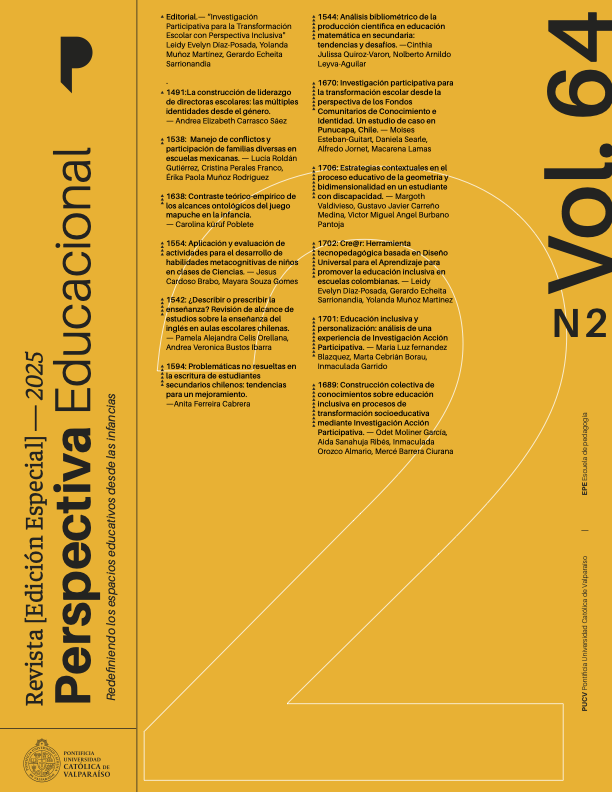The Construction of School Directors’ Leadership: Multiple Identities From Gender
DOI:
https://doi.org/10.4151/07189729-Vol.64-Iss.2-Art.1491Keywords:
Identity leadership women principals schoolsAbstract
La construcción de la identidad de liderazgo es un campo emergente de investigación, el cual ha ido evolucionando a través de la incorporación de la perspectiva de género. Este estudio indaga en cómo las directoras de establecimientos educativos chilenos han configurado su identidad de liderazgo escolar. Se utilizó un enfoque cualitativo exploratorio y se realizaron entrevistas en profundidad a 12 directoras de la Región Metropolitana. Se concluye que en la construcción de las identidades de las directoras escolares confluyen la cultura escolar, la perspectiva de género y las propias subjetividades de cada una.
Palabra claves: Identidad; liderazgo; mujer; director de colegio; escuelas.
Abstract
The construction of leadership identity in education is an emerging field of research, which has evolved through the incorporation of the gender perspective and, therefore, requires greater knowledge and analysis, especially paying attention to the barriers and crises that female school principals face in their professional careers. Identity is the process by which identities are constructed and occurs within the relational space in which each person moves and interacts (Ricoeur, 1996; Ritacco & Bolívar, 2018). This interaction acquires vital importance in the educational scenario, particularly for those who hold leadership positions, since, as has been shown, the development of a strong professional identity has a marked influence on the way in which leadership is exercised within schools (Crow et al., 2017; Cruz-González et al., 2019). In this context, it is even more important to analyze how the experiences, context and practices in the exercise of leadership influence and relate to each other in the construction of identities of school principals.
Therefore, this study aims to investigate how Chilean school principals have shaped their school leadership identity based on their self-image as women. It seeks to answer the question: How do school principals define their leadership identity based on their self-image as women and their leadership role?
The methodology used was an exploratory qualitative approach based on a case study, prioritizing depth over representativeness. Twelve female school principals from the Metropolitan Region were selected for this study. The research technique used was in-depth interviews, which were conducted with each female principal. Grounded Theory was used for the analysis, and two categories of analysis emerged: self-representation as women and school principals, and the characteristics of leadership identity.
The results show, first of all, that the principals in this study represent themselves as women, mothers, caregivers, and school principals, and that the characteristics of their leadership identity are: sharing, understanding, empathizing with people in the school communities, avoiding competition and validating their continuing knowledge before others, while avoiding overworking and transforming themselves into superwomen.
In this sense, we conclude that female principals' identities are multiple and adapt according to the school context in which they operate, their experiences as women and mothers, and their interactions with others. This demonstrates that the construction of female principals' multiple identities is influenced by school culture, gender perspective, and each principal's own subjectivities. Their definition of their identity as women stems primarily from the socially imposed gender construct, which has stereotyped women as caregivers, close to the heart, sensitive, and empathetic, versus the stereotypical construct of men, characterized by more assertive, competitive, cold, and imposing masculinities. Furthermore, it is concluded that female principals have been developing their own identities of feminine leadership through differentiation from traditionally masculine norms and the ongoing validation of the knowledge they possess for the role they play.
References
Arar, K., & Shapira, T. (2016). Hijab and principalship: the interplay between belief systems, educational management and gender among Arab Muslim women in Israel. Gender and Education, 28(7), 851-866. https://doi.org/10.1080/09540253.2015.1124070
Armstrong, D., & Mitchell, C. (2017). Shifting identities: Negotiating intersections of race and gender in Canadian administrative contexts. Educational Management Administration and Leadership, 45(5), 825-841. https://doi.org/10.1177/1741143217712721
Blackmore, J. (2013). A feminist critical perspective on educational leadership. International Journal of Leadership in Education, 16(2), 139-154. https://doi.org/10.1080/13603124.2012.754057
Blackmore, J. (2017). ‘In the Shadow of Men’: The Historical Construction of Educational Administration as a ‘Masculinist’ Enterprise. En J. Blackmore, & J. Kenway (Eds.), Gender Matters in Educational Administration and Policy (pp. 27-48). Routledge. https://doi.org/10.4324/9781315175089-3
Bolivar, A. (2018). Una dirección necesitada de identidad profesional. Cuadernos De Pedagogía, 490(July), 60-64. https://www.researchgate.net/publication/326395828
Bustos, C., Oros, S., Álvarez, D., & Rebolledo, B. (2015). Presencia del enfoque de género en la gestión escolar en Chile. Temas de Educación, 21, 97-115. https://revistas.userena.cl/index.php/teduacion/article/view/655
Butler, J. (2001). El marxismo y lo meramente cultural. En S. Watkins (Ed.), ¿Redistribución o Reconocimiento? Un debate entre marxismo y feminismo? (pp. 67-88). Traficantes de Sueños.
Canales, M. (Ed.). (2006). Metodologías de investigación social. Introducción a los oficios. LOM.
Carrasco, A., & Díaz, M. E. (2021). The construction of a leadership identity based on empathy, care, and participation: María Eliana’s history. Educational Management Administration and Leadership, 51(6), 1322-1339. https://doi.org/10.1177/17411432211038012
Coleman, M. (2007). Gender and educational leadership in England: A comparison of secondary headteachers’ views over time. School Leadership and Management, 27(4), 383-399. https://doi.org/10.1080/13632430701562991
Crow, G., Day, C., & Møller, J. (2017). Framing research on school principals’ identities. International Journal of Leadership in Education, 20(3), 265-277. https://doi.org/10.1080/13603124.2015.1123299
Cruz-González, C., Domingo Segovia, J., & Lucena Rodriguez, C. (2019). School principals and leadership identity: A thematic exploration of the literature. Educational Research, 61(3), 319-336. https://doi.org/10.1080/00131881.2019.1633941
Cruz-González, C., Lucena, C., & Domingo, J. (2020). Female principals leadership identity: A review of the literature. The International Journal of Organizational Diversity, 20(1), 24-43. https://doi.org/10.4324/9780429276446-3
Cruz-González, C., Pérez Muñoz, M., & Domingo Segovia, J. (2020). Marta’ s story: a female principal leading in challenge contexts contexts. School Leadership & Management, 40(5), 384-405. https://doi.org/10.1080/13632434.2020.1719401
Davids, N. (2018). When Identity and Leadership Intersect: The Experiences of Six Female Principals in South Africa. Africa Education Review, 15(1), 157-174. https://doi.org/10.1080/18146627.2016.1264865
De Lauretis, T. (2000). Diferencias. Etapas de un camino a través del feminismo. Horas y Horas.
Dubar, C. (2002). La crisis de identidades: La interpretación de una mutación. Edicions Bellaterra.
Falabella, A., Barco, B., Fernández, L., Figueroa, D., & Poblete Núñez, X. (2022). Un liderazgo de doble filo: directoras en establecimientos de educación inicial. Calidad En La Educación, 56, 255-291. https://doi.org/10.31619/caledu.n56.1189
Fraser, N. (2001). ¿De la redistribución al reconocimiento? Dilemas de la justicia en la era postsocialista. En S. Watkins (Ed.), ¿Redistribución o Reconocimiento? Un debate entre marxismo y feminismo? (pp. 7-23). Traficantes de Sueños.
Fuller, K. (2010). Talking about gendered headship: how do women and men working in schools conceive and articulate notions of gender? Journal of Educational Administration and History, 42(2), 363-382. https://doi.org/10.1080/00220620.2010.514041
Fuller, K. (2014). Gendered educational leadership: beneath the monoglossic façade. Gender and Education, 26(4), 321-337. https://doi.org/https://doi.org/10.1080/09540253.2014.907393
Fuller, K. (2022). Feminist theory and Educational leadership: a review of selected literature. En K. Fuller (Ed.), Feminist perspectives on contemporary educatioanl leadership (pp. 20-38). Routledge. https://doi.org/10.4324/9780367855635-3
Glaser, B. G., & Strauss, A. L. (2017). Discovery of Grounded Theory: Strategies for Qualitative Research. Routledge. https://doi.org/10.4324/9780203793206
Goffman, E. (2001). Estigma: La identidad deteriorada. Amorrortu.
Heffernan, A., & Thomson, P. (2020). Manufacturing the woman leader: how can wardrobes help us to understand leadership identities? En R. Niesche & A. Heffernan (Eds.), Theorising Identity and Subjectivity in Educational Leadership Research (pp. 82-96). Routledge. https://doi.org/10.4324/9780429032158-7
Hernández-Sampieri, R., Fernández, C., & Baptista, P. (2014). Metodología de la Investigación. McGraw-Hill.
Honneth, A. (1997). La lucha por el reconocimiento: una gramática moral de los conflictos sociales. Crítica Grijalbo Mondado.
Jones, D. (2017). Constructing identities: Female head teachers’ perceptions and experiences in the primary sector. Educational Management Administration and Leadership, 45(6), 907-928. https://doi.org/10.1177/1741143216653973
Lagarde, M. (1996). Género y feminismo. Desarrollo humano y democracia. Horas y Horas.
Lamas, M. (2000). Diferencias de sexo, género y diferencia sexual. Cuicuilco, 7(18), 111-136. https://doi.org/10.2307/j.ctv2v88bq0.6
Lucena, C., Cruz-González, C., & Domingo, J. (2021). Principal professional identity: Giving voice to children in a vulnerable Spanish context. Educational Management Administration and Leadership, 51(5), 1161-1180. https://doi.org/10.1177/17411432211030750
Lumby, J. (2015). School leaders’ gender strategies: Caught in a discriminatory web. Educational Management Administration & Leadership, 43(1), 28-45. https://doi.org/10.1177/1741143214556088
Mac Ruaric, G. (2020). That’s enough about me: exploring leaders’ identities in schools in challenging circumstances. En R. Niesche, & A. Heffernan (Eds.), Theorising identity and subjectivity in Educational Leadership Research (pp. 191-205). Routledge. https://doi.org/10.4324/9780429032158-14
Ministerio de Educación de Chile. (2021). Base de datos de Cargos Docentes. https://datosabiertos.mineduc.cl/
Morgade, G. (2001). Aprender a ser Mujer, Aprender a ser varón. Ediciones Novedades Educativas.
Molinier, P. (2018). El cuidado puesto a prueba por el trabajo. Vulnerabilidades cruzadas y saber-hacer discreto. En N. Borgeaud-Garciandía (Ed.), El trabajo de cuidado (pp. 191-214). Fundación Medifé Edita.
Netolicky, D. M. (2020). Being, becoming and questioning the school leader: an autoethnographic exploration of a woman in the middle. En R. Niesche, & A. Heffernan (Eds.), Theorising identity and subjectivity in Educational Leadership Research (pp. 111-125). Routledge. https://doi.org/10.4324/9780429032158-9
Paperman, P. (2019). Cuidado y sentimientos. Fundación Medifé Edita.
Ricoeur, P. (1996). Sí mismo como otro. Siglo XXI.
Ritacco, M., & Bolivar, A. (2018). Identidad profesional y dirección escolar en España: la mirada de los otros. Revista Brasileira de Educação, 23, e230083. https://doi.org/10.1590/s1413-24782018230083
Scott, J. W. (1990). El género: una categoría útil para el análisis histórico. En J. Amelang, & M. Nash (Eds.), Historia y género: las mujeres en la Europa moderna y contemporánea (pp. 23-58). Edicions Alfons el Magnanim.
Stake, R. E. (1999). Investigación con Estudio de Casos. Ediciones Morata.
Troncoso, L., Follegati, L., & Stutzin, V. (2019). Más allá de una educación no sexista: aportes de pedagogías feministas interseccionales. Pensamiento Educativo 56(1), 1-15. https://doi.org/10.7764/PEL.56.1.2019.1
Tronto, J. (2018). Economía, ética y democracia: tres lenguajes en torno al cuidado. En L. Arango (Ed.), Género y cuidado. Teorías, escenarios y políticas (pp. 22-37). Publicación Universidad Nacional de Colombia.
Weiner, J., & L. Burton. (2016). “They Were Really Looking for a Male Leader for the Building”: Gender, Identity and Leadership Development in a Principal Preparation Program. Frontiers in Psychology, (7), Artículo 141. https://doi.org/10.3389/fpsyg.2016.00141
Wilkinson, J., Purvee, A., & MacDonald, K. (2021). Gender and educational Leadership. En S. J. Courtney, H. M. Gunter, R. Niesche, & T. Trujillo (Eds.), Understanding Educational Leadership (1.a ed., pp. 225-268). Bloomsbury Academic.
Downloads
Published
How to Cite
Issue
Section
License
Copyright (c) 1969 Andrea Elizabeth Carrasco Sáez, Ignacia Palma

This work is licensed under a Creative Commons Attribution-ShareAlike 4.0 International License.
The authors grant an exclusive licence, without time limit, for the manuscript to be published in the Perspectiva Educacional journal, published by the Pontificia Universidad Católica of Valparaíso (Chile), through the School of Pedagogy.





